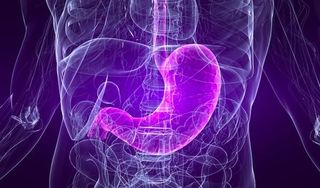10 Fascinating Facts About Your Digestive System
You’re not always hungry when your stomach growls.

Did you know you can eat while hanging upside down? Or why your stomach growls, even when you aren’t hungry? Did you know your small intestine plays the biggest role in your digestion?
Here are 10 facts about your digestive system that may surprise you.
1. Digestion Is Important for Your Health
While you know that food is important for sustenance, you may not know that digestion is the process that turns food into energy and nutrients. Digestion is especially important for nutrition, energy, and cell repair.1
2. Your Stomach Doesn't Play the Biggest Role in Absorption of Nutrients
The stomach begins the digestion process by churning food and breaking it down using digestive acids. This is referred to as mechanical digestion. But the actual absorption of that food takes place mainly in the small intestine. Similar to the stomach, there are enzymes in the small intestine to help further break down food, making it easier for nutrients to be absorbed and used by the body.
3. You Can Eat Upside Down.
Food doesn't need gravity to reach your stomach. When you eat something, the muscles in your esophagus constrict and relax in a wavelike manner, which is called peristalsis and pushes food along the esophagus and into the stomach. It's difficult to eat upside down, but it's possible.
4. The Large Intestine Is Responsible for More Than Eliminating Waste
The large intestine turns liquid waste into solid stool. The large intestine is also responsible for absorbing remaining nutrients and water the body needs. Waste products include undigested parts of food as well also older cells from the GI tract.1
5. The Stomach Must Protect Itself From Acid
Your stomach's primary digestive juice—called hydrochloric acid—is highly corrosive. The stomach protects itself with a thick layer of mucus. Without that layer, the stomach acid would digest the stomach itself.
6. The Small Intestine Has a Surprisingly Large Surface Area
The small intestine of the average adult is around 22 feet long.2 The small intestine has a much larger surface area than you would expect because of its many folds and finger-like projections, called villi. This large surface area is important because the small intestine is better built to absorb nutrients from food—which is vital to your health.
7. Stomach Growling Can Happen When You're Not Hungry
Stomach rumbling is the sound of your stomach and small intestines engaging in the digestive process. When your stomach is full, you can't hear the sound because it's muffled. Your stomach contracts to ensure there is no leftover food in the stomach. When that happens, you may feel and even hear that growling sound. That sound tells you that your stomach is empty, but it may not necessarily mean you are hungry.
8. Your Colon Reabsorbs Water From Food
You get a lot of your water from food. Your colon is a vital part of your digestive health, and ensures that you don't lose too much water during the digestion process.
9. You Feed Your Healthy Gut Bacteria
The healthy bacteria in your digestive system need nutrients just like you do. Soluble fiber nourishes healthy gut bacteria, which, in turn, contributes to colon health. Many foods have soluble fiber: vegetables, fruits, grains, seeds, and nuts. Also, a fiber supplement like Benefiber can provide soluble fiber—which nourishes good gut bacteria.
10. Fiber Is Important for Digestion
Fiber is important to help food move through the digestive tract and certain types of fiber can help you maintain regularity. Soluble fiber provides nutrients to healthy gut bacteria that play an important role in good digestive health.
Reference:

Post a Comment